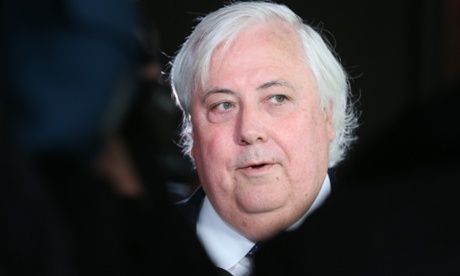Clive Palmer's changes may doom proposed emissions trading scheme
Fresh amendments, including the addition of India to list of ETS partners, mean proposal has a bleak future

party meeting at their press club offices in Canerra, Tuesday 15th July
2014 #politicslive Photograph by Mike Bowers for The Guardian Australia
Photograph: Mike Bowers
New conditions attached by Clive Palmer to the activation of his
proposed “dormant” emissions trading scheme (ETS) mean it is unlikely to
ever happen and will now be opposed by Labor, even though it supports
emissions trading.
The dormant scheme was a key part of
Palmer’s surprise announcement alongside the former US vice-president Al
Gore and at the time he said it would be activated “based upon the
actions of our leading trading partners China, the United States of
America, the European Union, Japan and Korea”.
The “trigger”
for activating the ETS has varied during the drafting of the plan, which
will be presented as an amendment to legislation abolishing the Climate
Change Authority.
At times during negotiations the amendment
has been worded flexibly, requiring trading partners to reduce emissions
by an equivalent amount to Australia’s efforts, whether through a
nationwide ETS or “equivalent” policies.
But now the Palmer
United party (PUP) is insisting trading partners meet their emissions
reduction promises with an emissions trading scheme, and has added
India to the list at the last minute.
The deputy chief
executive of the Climate Institute, Erwin Jackson, said the new
conditions contradicted PUP's claim to be in favour of global action on
climate change.
"Given India’s historic role internationally in
pushing for equitable contributions from countries, it would be a toxic
bomb to international negotiations now if Australia indicates that
credible action is conditional on similar action from countries like
India," Jackson said. "It would certainly work against the PUP push for
more global action."
The changes mean the “trigger” is unlikely
to be met for many years, because even if other countries adopt
ambitious greenhouse targets they may not choose to implement them with a
nationwide ETS. The EU and Korea have a carbon price. The US has a
price in only some states after Barack Obama failed to get his
cap-and-trade scheme through Congress. Obama is now moving to meet
emissions reduction targets through strict regulations, including on
power station emissions. China has some regional emissions trading
schemes but no national scheme. India has a small tax on coal, but as a
developing country is unlikely to take on similar policies to Australia
and its other trading partners.
"No 1, there's an ETS in the
following basket of countries which include India, China, South Korea,
Japan, the United States and the [EU] – they've got to have a national
ETS for ours to be effective," Palmer said when asked about the plan on
Monday.
"Secondly, the price of carbon has got to be such that it doesn't affect our business competitiveness with those countries.
"And the third thing, it can be disallowed by the houses of parliament."
Sources
said the last-minute changes mean Labor, which had been considering the
amendment, cannot support it and the fate of the amendment is unclear.
The government has also reiterated that it does not support emissions
trading.
The Climate Change Authority repeal bill, to which
the amendment would be attached, is on the list of bills the government
is demanding a vote on before the Senate breaks for its winter recess,
but that list is under negotiation between the parties. The climate
change authority repeal bill may be delayed until August.
Palmer’s
stance on the issue of global warming has been varied. This week he
said: “When it comes to fighting climate sceptics you have to
persevere.”
But before the election, when asked by the ABC
whether he agreed global warming would have a big impact on Australia,
he said: “No, I don't believe that's so. There's been global warming for
a long time. I mean, all of Ireland was covered by ice at one time.
There were no human inhabitants in Ireland. That's how the world has
been going over millions and billions of years and Ross Garnaut knows
that's true, so I think that's part of the natural cycle.”
No comments:
Post a Comment